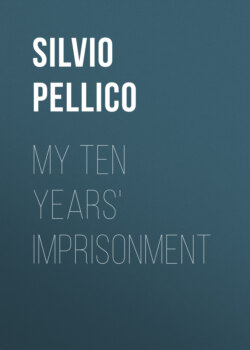Читать книгу My Ten Years' Imprisonment - Silvio Pellico - Страница 12
На сайте Литреса книга снята с продажи.
CHAPTER VIII.
ОглавлениеTable of Contents
I am so far fortunate, I often said, that they have given me a dungeon on the ground floor, near the court, where that dear boy comes within a few steps of me, to converse in our own mute language. We made immense progress in it; we expressed a thousand various feelings I had no idea we could do, by the natural expressions of the eye, the gesture, and the whole countenance. Wonderful human intelligence! How graceful were his motions! how beautiful his smile! how quickly he corrected whatever expression I saw of his that seemed to displease me! How well he understands I love him, when he plays with any of his companions! Standing only at my window to observe him, it seemed as if I possessed a kind of influence over his mind, favourable to his education. By dint of repeating the mutual exercise of signs, we should be enabled to perfect the communication of our ideas. The more instruction he gets, the more gentle and kind he becomes, the more he will be attached to me. To him I shall be the genius of reason and of good; he will learn to confide his sorrows to me, his pleasures, all he feels and wishes; I will console, elevate, and direct him in his whole conduct. It may be that this my lot may be protracted from month to month, even till I grow grey in my captivity. Perhaps this little child may continue to grow under my eye, and become one in the service of this large family of pain, and grief, and calamity. With such a disposition as he has already shown, what would become of him? Alas; he would at most be made only a good under-keeper, or fill some similar place. Yet I shall surely have conferred on him some benefit if I can succeed in giving him a desire to do kind offices to the good and to himself, and to nourish sentiments of habitual benevolence. This soliloquy was very natural in my situation; I was always fond of children, and the office of an instructor appeared to me a sublime duty. For a few years I had acted in that capacity with Giacomo and Giulio Porro, two young men of noble promise, whom I loved, and shall continue to love as if they were my own sons. Often while in prison were my thoughts busied with them; and how it grieved me not to be enabled to complete their education. I sincerely prayed that they might meet with a new master, who would be as much attached to them as I had been.
At times I could not help exclaiming to myself, What a strange burlesque is all this! instead of two noble youths, rich in all that nature and fortune can endow them with, here I have a pupil, poor little fellow! deaf, dumb, a castaway; the son of a robber, who at most can aspire only to the rank of an under-jailer, and which, in a little less softened phraseology, would mean to say a sbirro. [2] This reflection confused and disquieted me; yet hardly did I hear the strillo [3] of my little dummy than I felt my heart grow warm again, just as a father when he hears the voice of a son. I lost all anxiety about his mean estate. It is no fault of his if he be lopped of Nature’s fairest proportions, and was born the son of a robber. A humane, generous heart, in an age of innocence, is always respectable. I looked on him, therefore, from day to day with increased affection, and was more than ever desirous of cultivating his good qualities, and his growing intelligence. Nay, perhaps we might both live to get out of prison, when I would establish him in the college for the deaf and dumb, and thus open for him a path more fortunate and pleasing than to play the part of a shirro. Whilst thus pleasingly engaged in meditating his future welfare, two of the under-jailers one day walked into my cell.
“You must change your quarters, sir!”
“What mean you by that?”
“We have orders to remove you into another chamber.”
“Why so?”
“Some other great bird has been caged, and this being the better apartment—you understand.”
“Oh, yes! it is the first resting-place for the newly arrived.”
They conveyed me to the opposite side of the court, where I could no longer converse with my little deaf and dumb friend, and was far removed from the ground floor. In walking across, I beheld the poor boy sitting on the ground, overcome with grief and astonishment, for he knew he had lost me. Ere I quite disappeared, he ran towards me; my conductors tried to drive him away, but he reached me, and I caught him in my arms, and returned his caresses with expressions of tenderness I sought not to conceal. I tore myself from him, and entered my new abode.
